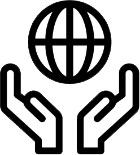Environmental

The Borchard Lines policy on Quality and Environmental Management is based on the adherence and commitment to all relevant legislation and regulation to secure the safe operation of the ships and the protection of the environment. Borchard Lines insists that all the ships operated adhere to International rules and regulations, standards and codes of organisations, authorities and classification societies, in their latest edition, including: the ISM safety management code, MARPOL for prevention of pollution of seas and the STCW code 1995 implementing international standards to vessels’ crew. Borchard Lines are also active in promoting the effective application of the EU Directive 2000 / 59 / EC which is concerned with the reduction of ships waste disposed into the sea thereby doing our part to ensure cleaner seas and coastlines for future generations.
Air pollution continues to take great prominence in planning the of service delivery. Key objectives are reduction of carbon footprint as well as compliance with the 0.5% sulphur limit coming into force from January 2020 and future limits on NOx emissions. The carbon emissions reduction target is a continuous process which Borchard sets out to achieve by a variety of means. For example: by operating feeder size vessels Borchard are able to provide liner services direct between ports too small or uneconomic for larger vessels to call, thereby delivering containers closer to their market and reducing the use of less efficient modes of transport, such as road and rail, whilst also providing the added security to cargo achieved by making direct calls; Services are planned to maximise vessel utilisation throughout each voyage to reduce the overall environmental impact per TEU mile actually carried; Port work windows allow for vessel speeds to be adjusted for just in time arrival reducing the need to sail at fast speeds to congested ports.
The new sulphur regulations will require the industry to make significant investments to either install emissions abatement technology or purchase more expensive, compliant fuels.

